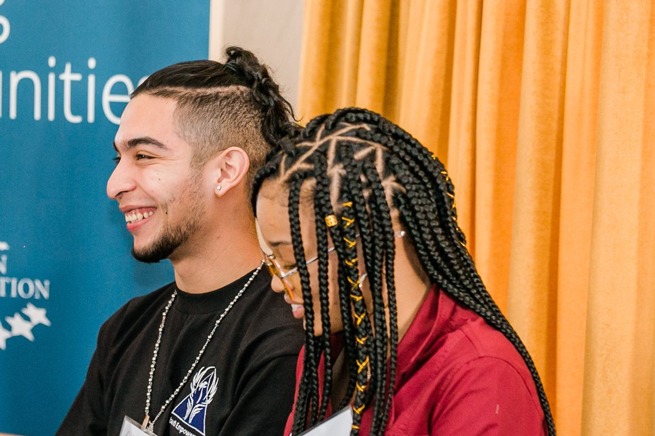For youth who have experienced the juvenile justice system, either through detainment or incarceration, that interaction in the justice system can disrupt their ability to establish building blocks for lifelong health including education, employment, and family and social supports. To create systemic change, it’s critical to listen to those with lived experience, and that is what the “Strong Families, Thriving Communities (SFTC)” coalition is doing.
SFTC, led by the Clinton Foundation’s Health Matters Initiative, in partnership with The San Diego Foundation and the County of San Diego, aims to align policies, practices, and resources in the child welfare and juvenile justice systems to increase equity and effectiveness for impacted children and families in San Diego. Youth that are served by STFC member organizations came up with the idea to create a new Trauma-Informed Care Code of Conduct with the goal of it being adopted by a wide range of organizations, to help staff treat young people who come through their doors in a way that establishes trust, is sensitive to past trauma, and builds resilience.
Below is a reflection by formerly incarcerated youth, Jonathan Curiel of California, who shares his experience and discusses what the Code of Conduct means to him:
I’ve been in and out of multiple systems — in Moorhead, Minn. and East Mesa, Calif. — and overall, jail and detention centers are just not a place you want to be. You’re not able to come and go as you please, talk to your friends, or just live your life. It’s a different world.
The last time I was confined, I was struggling with everything I was facing and with everything I was going through, and I didn’t even know when I was getting out. But while I was in there some of the staff there really sat and talked to me, giving me some hope and inspiration.
Through my experience and the lessons learned, I realized that I do not want to go down the same path as my family members or friends to become another statistic. The birth of my daughter was also another big moment that changed my mentality. Not being able to hold her when I wanted was difficult. I wanted to be a better parent. I wanted to be free and be there for her.
It was a relief to get out, but scary as well, because I was going back into the same environment with negative influences. The transition of going back into the real world is difficult and what I needed the most was moral motivation. Someone to give me a push and ask, “How can I help?” More than a list of available services, I needed encouragement and positive thinking, because at first, I wasn’t sure I could make it and then there are some naysayers who try to discourage you and say things like, “You’ll be back soon.” Thankfully, I got one-on-one support from Arturo, who is the founder and CEO of Youth Empowerment, and my mentor.
Arturo was there for me as soon as I got out and gave me the push I needed and helped me to believe in myself. He knew how to talk to me, how to challenge me — but not attack me, and how to make me feel like an empowered individual. He really understood what I was going through. Who would I trust more? Someone who knows and understands my life struggles or someone who only studied it at school?
Arturo also introduced me to the Code of Conduct. The Code of Conduct was developed by my fellow peers and is a statement of guiding principles that we believe government agencies and organizations who interact with youth should adopt and adhere to. Here’s what these principles — Safety, Supportive Staff, Effective Communication, and Individualized Support — mean to me:
Safety: Safety is the biggest thing for youth coming out of the juvenile system. When young people don’t feel safe (physically and emotionally) it can lead to them getting into trouble, and not opening up to people because they don’t trust authority.
Supportive Staff: When you have support it can really change your thinking. I’ve had positive and negative experiences with staff at the places I’ve been in, and what we’d like to see is consistency. Training and buy-in for all staff so that every kid or teen that they encounter gets the same supportive, positive treatment.
Effective Communication: Growing up I wanted someone to listen and acknowledge my struggles and my parents just didn’t communicate in that way enough. It’s important to have staff that are there for you and be a person you can turn to with questions, concerns, and thoughts.
Individualized Support: Having a mentor or role model, someone who is a support system and is encouraging even when you are off probation or out of the system has a big influence on youth. It has 100% made a difference in my life.
The whole process of working on the Code of Conduct with my peers has made me feel like I’ve accomplished something big, and I now feel like I have a voice. I will continue doing my part and working to get it implemented in as many places as possible, because it changes mindsets and builds communities of support systems. I want to continue being an example for others and let youth know that there are people rooting for them and that change is always possible.




